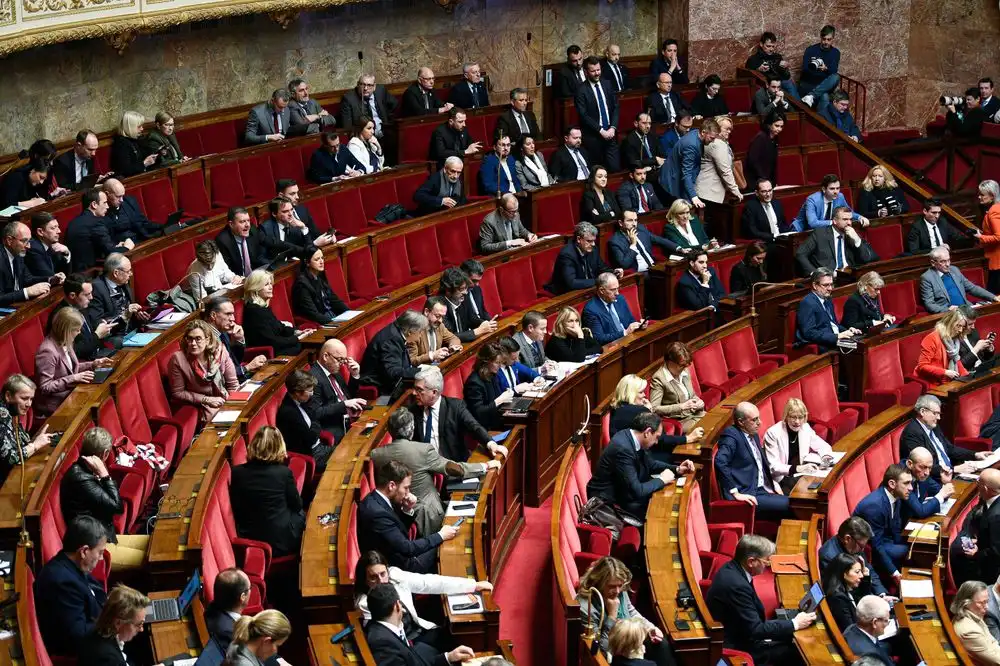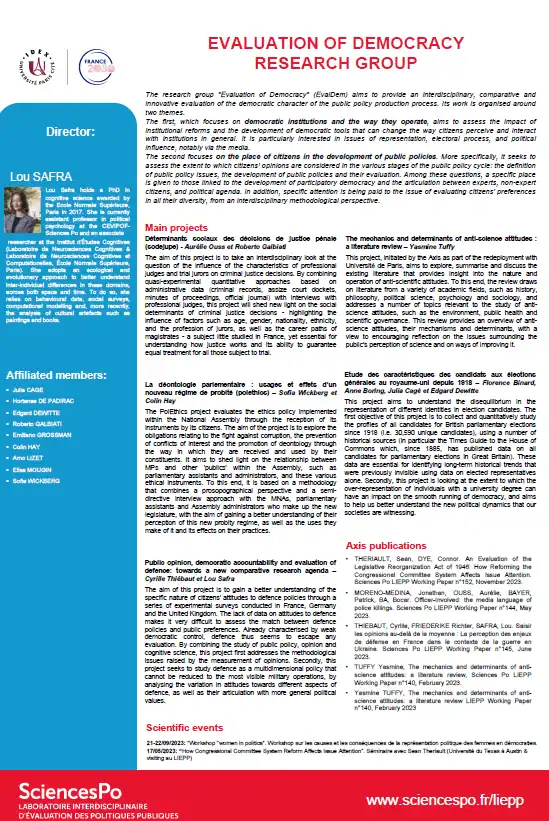
Home>Research>Research Groups>Evaluation of Democracy
Research Group: Evaluation of Democracy
Research Group directors: Patrick LE LIDEC, Lou SAFRA
Involved members:
Julia CAGE, Pietro CASTELLI GATTINARA, Paul COTTON, Roberto GALBIATI, Colin HAY, Laura KEESMAN, Rachida LARINOUNA, Felipe LAURITZEN, Elisa MOUGIN, Héloïse NEZ, Jan ROVNY, Olivia TSOUTSOPLIDI, Eugenio VERRINA, Paulus WAGNER, Sofia WICKBERG, Andrew ZOLA
Presentation of the Evaluation of Democracy Research Group

The research group "Evaluation of Democracy" (EvalDem) aims to provide an interdisciplinary, comparative and innovative evaluation of the democratic character of the public policy production process. Its work is organised around two themes.
The first, which focuses on democratic institutions and the way they operate, aims to assess the impact of institutional reforms and the development of democratic tools that can change the way citizens perceive and interact with institutions in general. It is particularly interested in issues of representation, electoral process, and political influence, notably via the media.
The second focuses on the place of citizens in the development of public policies. More specifically, it seeks to assess the extent to which citizens’ opinions are considered in the various stages of the public policy cycle: the definition of public policy issues, the development of public policies and their evaluation. Among these questions, a specific place is given to those linked to the development of participatory democracy and the articulation between experts, non-expert citizens, and political agenda. In addition, specific attention is being paid to the issue of evaluating citizens' preferences in all their diversity, from an interdisciplinary methodological perspective.
Seminars of the research group
The Evaluation of Democracy research group organizes seminars open to all, presenting research work on various topics related to its research themes.
Find out more about the Evaluation of Democracy Seminars.
Associated research projects
Ongoing projects
- Understanding the Acceptability of Social Policies (CAPS) (2025)
- Energy justice, public action and collective mobilisation: a European comparison (JUSTENERGY) (2025)
- Selective accountability : Media Visibility and Parliamentary Behavior (2024)
- A matter of reciprocity: does increasing recognition for ‘those who work’ decrease support for blaming welfare recipients? (RECIPROC) (2024)
- La gouvernance urbaine face à la participation citoyenne : Etude de la trajectoire organisationnelle d’une innovation institutionnelle - Cas de la Coordination Nationale des Conseils de Développement (Traj-Inno-Démoc) (2024)
- Shocking Belief Systems (SBS) (2024)
- La déontologie parlementaire : usages et effets d’un nouveau régime de probité (PolEthics) (2022)
- Évaluer des interventions complexes : le cas de la Politique d’animation de la vie sociale (en partenariat avec la Caisse Nationale des Allocations Familiales) (2022)
- Déterminants Sociaux des Décisions de Justice Pénale (SoDeJuPe) (2023)
- Inclusive Democracies? Conceptualising and Measuring the Descriptive and Substantive Political Representation of Under-represented Groups in Democratic Parliaments (InclusiveParl) (2021)
- Public opinion, democratic accountability and evaluation of defence: towards a new comparative research agenda (OPIDEF) (2020)
- The mechanics and determinants of anti-science attitudes : a litterature review (2020)
- Study of the characteristics of candidates in general elections in the United Kingdom since 1918 (2019)
- Evaluating Anti-Corruption Policies (2017, 2019)
- Ethnicity and Policy : Ethnic Group Identity, Political Competition and Policies Outcomes in Europe - ETHPOL (2017)
- Independence and Quality of Mass Media in the Internet Age - MIRAGE (2017)
- Etat de la démocratie (2017)
- The use of digital technology to Assess the Impact of Parliament on the Lawmaking Process (2016)
- Reception and Judgement of Socio Fiscal and Symbolic Policies (2016)
- Evaluating the Impact of the July 2008 Constitutional Reform (2015 and 2016)
- Evaluation de l'efficacité des aides à la presse (2015)
- Who Owns the Media? Capital, Governance and Independence (2015)
- Systèmes électoraux : quel impact, quelles régulations ? (2015)
- Policy Agreement and Political Support (2015)
- « Symbolitique » - How to evaluate political symbols? (2015)
- New Perspectives on Institutional Change (2015)
- The Dualization of Europe (2015)
- Long-term Evaluation of Public Policies: An Historical Investigation Into Colonial Policies in French Western Africa and its Impacts on Modern Political Attitudes and Intra-state Conflicts (2015)
- Baromètre des priorités politiques (2014-2017)
- 2014 Chapel Hill Expert Survey Data (2014)
- Policy evaluation, media dissemination and public perception of government performance (2013)
- Voting and public policies – elections 2012 (2013)
Publications of the research group
- Sean THERIAULT, Connor DYE An Evaluation of the Legislative Reorganization Act of 1946: How Reforming the Congressional Committee System Affects Issue Attention LIEPP Working Paper n°152, 2023
- Cyrille THIEBAUT, Lou SAFRA, Friederike RICHTER Saisir les opinions au-delà de la moyenne : La perception des enjeux de défense en France dans le contexte de la guerre en Ukraine LIEPP Working Paper n°145, 2023
- Yasmine TUFFY, The mechanics and determinants of anti-science attitudes: a literature review LIEPP Working Paper n°140, February 2023
- Alina MUNGIU-PIPPIDI, Challenges and innovations to the rule of law measurement Sciences Po LIEPP Working paper, n°137, October 2022
- Aurélie OUSS, Jonathan MORENO-MEDINA, Patrick BAYER, Bocar BA Officer-Involved: the media language of police killings ,LIEPP Working Paper n°144, 2023
- Julia CAGE, Edgard DEWITTE, When Does Money Matter for Elections? LIEPP Policy Brief n°58, March 2022
- Clémence TRICAUD, Better Alone? Evidence on the Costs of Intermunicipal Cooperation LIEPP Working Paper n°125, October 2021
- DELATTE Anne-Laure, Benjamin LEMOINE, Expertise économique et politique publique : examen critique des propositions sur la dette liée à la pandémie. Note de recherche LIEPP Working Paper n°118, March 2021
- WICKBERG Sofia, Giulia MUGELLINI , The evolving nature of evidence as used within the international anti-corruption community LIEPP Working Paper n°117, December 2020
- Max VISKANIC, Paul VERTIER, Matteo GAMALERIO, Dismantling the "Jungle" : Relocation and Extreme Voting in France LIEPP Working paper n°110, September 2020
- Emiliano GROSSMAN, Mirjam DAGEFÖRDE, Why are citizens satisfied with public policies (or not) ? LIEPP Report [Policy Book], July 2020
- Paul LENORMAND, Jan ROVNY, Cooperating with the Czechs, driving the State. German activist policies through biographical trajectories and administrative records (1918-1938) LIEPP Working Paper n°108, April 2020
- Maria Victoria ALVAREZ, Opposing regional integration in comparative perspective: understanding opposition of public opinion to regional integration in Europe and Latin America LIEPP Working Paper n°107, March 2020
- Jan ROVNY, Circumstantial Liberals: Czech Germans in Interwar Czechoslovakia LIEPP Working Paper n°101, January 2020
- Max VISKANIC, Fear and Loathing on the Campaign Trail: Did Immigration Cause Brexit ? LIEPP Working Paper n°100, January 2020
- Denis SAINT-MARTIN, A la rescousse des champions nationaux: le pouvoir politique des entreprises et la refonte du régime global de lutte contre la corruption LIEPP Working Paper n°99, January 2020
- Yael SHOMER, Björn Erik RASCH, Osnat AKIRAV, The inflated measures of governmental instability LIEPP Working Paper n°96, November 2019
- Olivier PILMIS, The Dynamics of Expectations. A Look on Forecasting as a Sequence LIEPP Working Paper n°91, September 2019
- Hortense DE PADIRAC, Olivier ROZENBERG, L'évaluation au Parlement français: l'heure des choix LIEPP Policy Brief n°41, May 2019
- Jean-Charles BRICONGNE, Nuria MATA GARCIA, Alessandro TURRINI Macroeconomic Imbalance Procedure, economic reforms and policy progress in the European Union LIEPP Working Paper n°87, April 2019
- Sylvain BROUARD, L’introduction de la proportionnelle et la réduction de la taille des assemblées parlementaires vont-elles vraiment améliorer la proportionnalité de la représentation ? LIEPP Policy Brief n°39, March 2019
- Hortense DE PADIRAC, Le Parlement français et l’évaluation. Une institutionnalisation impossible ? LIEPP Working Paper n°80, October 2018
- Olivier ROZENBERG, Thomas EHRHARD, La réduction du nombre de parlementaires est-elle justifiée ? Une évaluation ex-ante , LIEPP Working Paper, n°75, February 2018
- Julia CAGE, Nicolas HERVE, Marie-Luce VIAUD The Production of Information in an Online World: Is Copy Right? , LIEPP Working Paper, n°72, January 2018
- Sylvain BROUARD, Martial FOUCAULT Préférences budgétaires des citoyens: résultats d'une expérience en ligne LIEPP Policy Brief n°34, December 2017
- Julia CAGE, Qui possède les médias ? LIEPP Policy Brief n°33, December 2017
- Julia CAGE, Olivier GODECHOT, Who Owns the Media? LIEPP Report, December 2017
- Sylvain BROUARD, Les effets de la loi interdisant le cumul de fonctions exécutives locales et des mandats parlementaires sur le renouvellement du personnel politique LIEPP Policy Brief, n°32, November 2017
- Olivier ROZENBERG, Contributions de Thomas EHRHARD, Marie-Alice KERNEIS, Richard KISS, Audrey DE MONTIS. Réctions de Olivier FAURE, Dominique RAIMBOURG, Rémi SCHENBERG, Eric THIERS, Jean-Pierre SUEUR, Eric TAVERNIER. La révision constitutionnelle du 23 juillet 2008 a-t-elle renforcé le Parlement français ? Débats du LIEPP n°3, March 2017
- Dimitri A. SOTIROPOULOS, How the quality of democracy deteriorates: Populism and the backsliding of democracy in three West Balkan countries , LIEPP Working Paper n°67, June 2017
- Bruno PALIER, Allison ROVNY, Jan ROVNY, European Disunion? Social and Economic Divergence in Europe, and their Political Consequences , LIEPP Working Paper n°71, November 2017
- Jennifer M. LARSON, Cheating Because They Can: The Role of Networks in Informal Governance LIEPP Working Paper n°62, December 2016
- Olivier ROZENBERG, Un petit pas pour le Parlement, un grand pas pour la Vème République. L’évaluation de la révision constitutionnelle de 2008. LIEPP Working Paper n°61, December 2016
- Sirianne DAHLUM, Carl Henrik KNUTSEN, Tore WIG, Who Revolt? Empirically Revisiting the Social Origins of Democracy LIEPP Working Paper n°60, November 2016
- Verena KROTH, Valentino LARCINESE, Joachim WEHNER, A Better Life for All? Democratization and Electrification in Post-Apartheid South Africa LIEPP Working Paper, n°53, May 2016
- Kimberly MORGAN, Policing Markets: Campaigns against Irregular Migrant Labor in Western Europe LIEPP Working Paper n°54, June 2016
- Quoc-Anh DO, Yen-Teik LEE, Bang Dang NGUYEN, Directors as Connectors: The Impact of the External Networks of Directors on Firms LIEPP Working Paper n°52, April 2016
- Sylvain BROUARD, Les effets des attentats de 2015 sur l'opinion publique : Priorité à la sécurité, stabilité sur l'immigration & hausse souhaitée des dépenses publiques LIEPP Policy Brief n°22, January 2016
- Florence FAUCHER, Laurie BOUSSAGUET, Mobiliser des symboles pour répondre au terrorisme LIEPP Policy Brief n°28, November 2016
- Filipe R. CAMPANTE, Quoc-Anh DO, Bernardo GUIMARAES, Capital Cities, Conflict, and Misgovernance , LIEPP Working Paper n°39, November 2015
- Emiliano GROSSMAN, Simon PERSICO Introduire la proportionnelle pour restaurer la confiance en la démocratie ? LIEPP Policy Brief n°18, June 2015
- Abel FRANCOIS, Nicolas SAUGER, Le vote obligatoire est-il une bonne solution ? LIEPP Policy Brief n° 17, April 2015
- Abel FRANCOIS, Raul MAGNI-BRETON, Les effets de la réglementation du cumul des mandats de 2001, LIEPP Policy Brief nº11, March 2014


